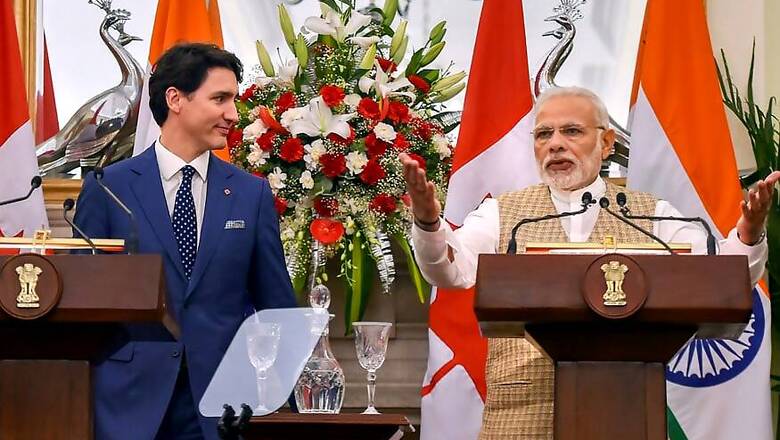
views
New Delhi: In the backdrop of the ‘Khalistan’ controversy surrounding Canadian Prime Minister Justin Trudeau’s visit, India has successfully managed to bring Canada to address the issue.
The two sides agreed on a ‘Framework for Cooperation on Countering Terrorism and Violent Extremism’ and issued a joint statement after the bilateral talks at the Hyderabad House on Friday afternoon.
The statement said that the Framework was based on “fundamental respect for the sovereignty, unity and territorial integrity of India and Canada”. The two countries also committed to work together to neutralise the threats emanating from terrorist groups Al Qaida, Islamic State, Haqqani Network, Lashkar-e-Taiba, Jaish-e-Mohammad, Babbar Khalsa International and the International Sikh Youth Federation.
“It is important that we work together to fight terrorism. Those who challenge our sovereignty and territorial integrity cannot be tolerated… There should be no place for those who misuse religion for political goals,” PM Modi said during his joint statement with Trudeau on Friday.
Trudeau came under fire on Thursday after Jaspal Atwal, a convicted former member of a Sikh separatist group, was invited to dine with the Canadian PM by Canada's High Commissioner to India.
Atwal was photographed with Sophie Gregoire Trudeau at an event in Mumbai this week. Atwal is a convicted former member of International Sikh Youth Federation. He was convicted of ambushing and firing at minister Malkiat Singh Sindhu in Vancouver Island in 1986.
The National Security Advisors of the two countries who met in New Delhi a few days ahead of Trudeau’s India visit, will now continue to be in contact through “regular exchanges and coordination” as has been agreed in the Framework.
Last year, Punjab Chief Minister Amarinder Singh had refused to meet Canadian Defence Minister Harjit Sajjan, calling him a Khalistani sympathiser, a charge Canada had vehemently refuted.
The Punjab Chief Minister, however, met both Trudeau and Sajjan on Wednesday and raised the Khalistan issue upfront. He extracted an assurance from Trudeau that his government supports a united India and will not allow violent extremist forces to take shape in Canada. In continuation of that stand, on Friday, both India and Canada emphasised the need to “deny operating space to terrorist and violent extremist groups”.
Details of the Framework added that India and Canada “recognised the urgent imperative to disrupt recruitment, terrorist movements and the flow of foreign terrorist fighters, address the threat posed by cross-border and state-sponsored terrorism, stop sources of terrorist financing, dismantle terrorist infrastructure and prevent supply of arms to terrorists and counter violent extremism and radicalisation to violence”.

















Comments
0 comment